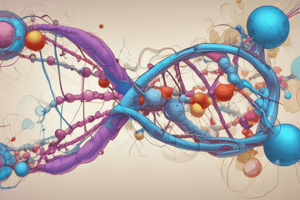Podcast
Questions and Answers
What does molecular genetics primarily focus on?
What does molecular genetics primarily focus on?
- The structure of proteins in organisms
- The physical and chemical properties of genes (correct)
- The environmental factors affecting gene expression
- The classification of different species
When was the structure of DNA discovered?
When was the structure of DNA discovered?
- 1990
- 1970
- 1953 (correct)
- 1930
What is the primary purpose of genetic engineering?
What is the primary purpose of genetic engineering?
- To study the behavior of organisms in their natural habitats
- To develop new species of organisms
- To control the climate for genetic experiments
- To manipulate an organism's genome (correct)
Which field of biology focuses on the overall makeup of an organism?
Which field of biology focuses on the overall makeup of an organism?
What are chromosomes identified as in molecular genetics?
What are chromosomes identified as in molecular genetics?
What is one of the key outcomes of comparative genomics?
What is one of the key outcomes of comparative genomics?
How does molecular genetics contribute to the study of agricultural pests?
How does molecular genetics contribute to the study of agricultural pests?
What field has molecular genetics significantly impacted apart from genetics?
What field has molecular genetics significantly impacted apart from genetics?
Why is comparative genomics considered a powerful tool in molecular genetics?
Why is comparative genomics considered a powerful tool in molecular genetics?
What is one of the practical applications of molecular genetics mentioned in the text?
What is one of the practical applications of molecular genetics mentioned in the text?
Flashcards are hidden until you start studying
Study Notes
Molecular Genetics: The Study of Genetic Information
Molecular genetics is a branch of biology that deals with the molecular structure of genetic material, its replication, and its influence on the overall makeup of an organism. It is the study of the physical and chemical properties of genes and their role in heredity and the development of organisms.
The Emergence of Molecular Genetics
The early 20th century saw a surge of interest in understanding the structure and function of genes. Chromosomes were identified as the carriers of genetic information, but the nature and mechanism of gene action remained a mystery. The discovery of the structure of DNA by Watson and Crick in 1953 marked the beginning of molecular genetics as a distinct field of study.
Molecular Structure of Genes
Molecular genetics focuses on the molecular structure of DNA, its replication, and its influence on the overall makeup of an organism. It relies heavily on genetic engineering techniques, such as recombinant DNA technology, which can be used to manipulate genes and study their functions in detail.
Genetic Engineering and Recombinant DNA Technology
Genetic engineering, or recombinant DNA technology, is a major tool in molecular genetics. It involves the manipulation of an organism's genome, such as the introduction of foreign DNA into an organism or the modification of an existing gene. This technology has revolutionized the field of molecular genetics, allowing scientists to study the function of genes in detail and to develop new technologies, such as gene therapy and genetic engineering.
Comparative Genomics
Comparative genomics involves the comparison of genomic sequences from different species to understand the evolutionary relationships between them. It is a powerful tool in molecular genetics, as it allows for the identification of conserved genes and gene functions, as well as the study of gene duplication and evolution.
Molecular Genetics in Agricultural Pests
Molecular genetics plays a crucial role in understanding the biology of agricultural pests, such as insects. Studies of the molecular structure of genes and genomics can help identify the genes involved in adaptation to specific selection pressures, such as pesticides, and provide insights into the genomic architecture of divergence between resistant and nonresistant populations.
The Role of Molecular Genetics in Modern Biology
Molecular genetics has had a profound impact on modern biology, shaping our understanding of heredity, evolution, and the development of organisms. It has also led to numerous applications in medicine, agriculture, and biotechnology, making it an essential field of study in the 21st century.
In conclusion, molecular genetics is a fundamental field of biology that provides insights into the structure, function, and evolution of genetic material. Its investigations into the molecular structure of DNA, its cellular activities, and its influence on the overall makeup of an organism have revolutionized our understanding of biology and led to numerous practical applications in various fields.
Studying That Suits You
Use AI to generate personalized quizzes and flashcards to suit your learning preferences.




